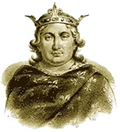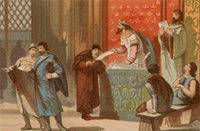The French King Louis VI
Louis VI ruled the Kingdom of France for a turbulent 29 years in the early 12th Century, striving against enemies foreign and domestic. 
He was born in 1081 in Paris. His father was King Philip I, and his mother was Bertha of Holland. He grew up in the royal household, while his father was busy putting down a handful of rebellions and trying to increase the royal domain. Louis married Lucienne de Rochefort in 1104; they had no children. Eleven years later, he married again, to Adelaide of Maurienne; they had eight children. In between, Louis had become king. His father had died in 1108, and Louis ascended the throne. Louis continued the internal struggles of his father, waging war against one recalcitrant noble after another, in many cases leading the castle sieges himself. Among his early targets was his half-brother Philip. One noble who repeatedly challenged the king was Hugh, Lord of Le Puiset. Three different times, the king battled Hugh for supremacy; each of the first two times, the noble had promised not rebuild the castle that the king's forces had burned down or raise another army. The king had finally had enough, and Hugh died on a pilgrimage to the Holy Land. During that noble's first attempt at insurrection, the king was embroiled in a dispute in Normandy with England's King Henry I. Henry was the fourth and youngest son of William the Conqueror, who had defeated England's King Harold at the Battle of Hastings in 1066 and assumed the English crown. Henry was with his brother, William Rufus, on Aug. 2, 1100, on a hunting expedition in the New Forest when William was shot dead. Henry, realizing that he could do nothing for his brother and worried about an insurrection, seized the royal treasury and summoned a kingly council, who proclaimed him king. Henry had seized the castle at Gisors, in clear violation of an earlier agreement between France and Normandy. Louis demanded that Henry return the castle to its neutral status. Henry refused and rebuffed Louis's subsequent demand for single combat to decide the issue. The two sides next met on the field of battle. The war lasted for 11 years, during which time a number of French nobles took the opportunity to join Henry's cause against Louis. The war ended only when both sides agreed to a peace, negotiated by Pope Calixtus II; Henry got to keep the Gisors castle. 
Louis did have success in the east, going to war on behalf of Robert Curthose, Henry's brother, and installing him as Count of Flanders. As opposed to their earlier opposition, many nobles in France saw this as a sign of Louis's leadership abilities, both military and politically. This shift in thinking on the part of the nobles came in handy a few years later, when the Holy Roman Emperor, Henry V, invaded France. Henry I of England had two children, William and Matilda. The former died in 1120, when the White Ship sank on a return journey from Normandy. At the time, the latter was married to Henry V. Henry had no other male heir, and a succession crisis ensued. The invasion of France by Henry V was in response to an attempt by Louis, at the head of a coalition of French nobles, to take over Normandy and install William Clito, son of Robert Curthose and Henry's nephew, as ruler there. The English king Henry had little trouble defeating the French force and retaliated by convincing his son-in-law, Henry V, to target Louis and his nobles. A united French force declared itself ready to do battle against the invaders, and Henry V called off the attack. He died the following year. By this time, Louis, like his father before him, had grown obese, so much so that he was no longer able to lead troops in the field. Historians often refer to him as Louis the Fat. He is also listed in some sources as Louis the Fighter. Henry I married his widowed daughter, then known as the Empress Matilda to Geoffrey Plantagenet, the Count of Anjou. The English king died seven years later, in 1135. Succeeding him was his brother, Stephen, who had promised to support Matilda's claim to the throne but reneged on that vow, prompting the Anarchy. In 1137, William X, Duke of Aquitaine, appointed the King of the Franks, Louis VI, as the guardian of William's daughter, who became Eleanor of Aquitaine. Louis wasted no time in marrying her to his own sun, also named Louis. King Louis VI died on Aug. 1, 1337, and his son became King Louis VII. The new king's wife became queen. |
|
Social Studies for Kids
copyright 2002–2026
David White




